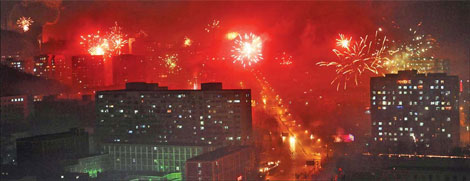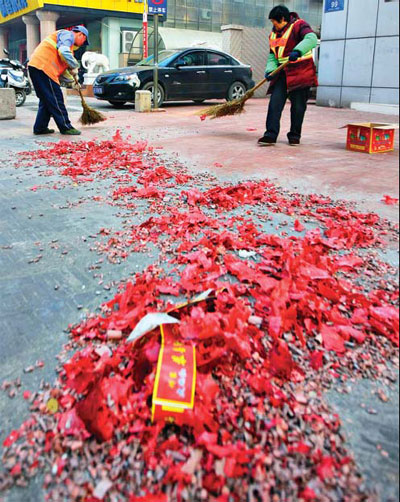Defusing the boom
Updated: 2012-02-08 10:04
By Zhang Yue and Zheng Jinran (China Daily)
|
|||||||||||
 |
|
Fireworks dominate the night sky in Shijingshan district, Beijing. Li Wenming / For China Daily |
 |
|
Sanitation workers clean trash from fireworks in Nantong, Jiangsu province. Xu Peiqin / For China Daily |
Decreasing fireworks sales nationwide suggest Spring Festival's pyrotechnic traditions are falling out of favor. Zhang Yue and Zheng Jinran report.
Sun Ruoran believes this year's Spring Festival was quieter than most. The 13-year-old Beijing resident understands why, because she, too, has lost enthusiasm for the tradition of heralding the Lunar New Year's arrival with fireworks.
"Mom asked if I wanted some firecrackers, but I'm not as interested in them as I used to be," she says.
"They are dangerous and scary, despite moments of brightness."
Her family lives in a 16-story building near the Asian Sports Village on the northern Fourth Ring Road, where limited fireworks are allowed during the holiday but large rockets are forbidden.
She recalls her neighbors drove to nearby counties to buy massive stocks of roman candles and bottle rockets in 2007.
"Almost all our neighbors were out setting off, or at least watching, fireworks just before midnight that Lunar New Year's Eve," she says.
"The whole yard was roaring with explosions and car alarms were bleating. It made the night fun."
This year, Sun stayed at home and made e-cards online, while her mom and grandparents watched the Spring Festival TV gala. Her upstairs neighbor, who bought fireworks in 2007, did not set any off either, because the family now believes fireworks are "expensive, dangerous and heavily polluting".
"Kids grow up," Sun's mother says. "And they have various ways of celebrating the New Year."
The families aren't alone in their diminishing zeal for pyrotechnic celebrations this Lunar New Year.
The amount of trash from fireworks decreased by 16 percent compared to last year's 5,500 tons, the Beijing-based Jinghua News reports.
Vendors also say sales are down.
"Business is harder than ever," says a 40-year-old vendor surnamed Ma, who has been selling firecrackers on the Third Ring Road since 2008.
Sunday, the day before Lantern Festival, would usually be a time for business to boom. But at 9 pm, she and her partners were still waiting for customers. Two college students stopped by but left after asking about prices.
"We feel like people don't like fireworks anymore," Ma says. "We may quit next year."
Ma says she and her partners stopped selling fireworks at 11 pm - two hours earlier than usual - this Lunar New Year's Eve.
But the decrease in fireworks purchases isn't confined to Beijing.
Zhang Fang, a 40-year-old who has been selling firecrackers in Anhui province's capital Hefei since 2006, says she only sold 70 percent of her stock this year.
"2006 and 2007 were the best for the fireworks business," she says.
"The maroons usually sell out on Lunar New Year's Eve. I feel people weren't willing to spend that much on fireworks this year."
Most of the unsold fireworks at Zhang's store are priced at more than 70 yuan ($11). She says the 10-yuan maroons finally sold out on the sixth day of the Lunar New Year.
Increasing air pollution concerns contribute to the decline in fireworks sales.
Chen Liwen says she didn't set any off when she visited her hometown in Cangzhou, Hebei province, this year.
"Fireworks were indispensable to the Spring Festival celebrations of my childhood," the 29-year-old says.
"My heart raced when they exploded. But now, I really hate the dust and trash, and the smell of the smoke that lingers for the entire festival."
Hunan province-based Panda Fireworks Group's marketing director Cheng Peng says developing greener fireworks that don't create pollution is critical to the pyrotechnic industry's future.
"Our company has developed green fireworks but haven't put them on the market because people can't afford the high prices," Cheng says.
Lu Hai, a chief resident of Beijing Tongren Hospital, which is famous for advanced eye treatment, has for years been advocating that people refrain from setting off fireworks during the Lunar New Year. He is happy to know fewer fireworks have been set off this year.
The 42-year-old surgeon has since 2006 spent Lunar New Year's Eves at the hospital to care for patients injured by fireworks. He says this year was his lightest workload yet.
"From New Year's Eve to the sixth day of the New Year, we received 115 patients - mostly children - injured by fireworks," he says.
"This is the fewest since 2006. Last year's figure was 170."
Media often interview Lu around the annual holiday, and he takes the opportunity to advocate re-instating the fireworks ban.
"Spring Festival should be a merry time of family reunions and thankfulness for the good things we have," he says.
"But every kind of firework is dangerous and polluting."
He vividly remembers a 26-year-old man surnamed Liu, whose left eye had received successful surgery in October, but returned to the hospital during the Lunar New Year with that eye blown apart by a bottle rocket.
"I sincerely hope to see the decline continue," Lu says.
"Such tragedies should never happen again. Then, the festival can truly be a time of health and joy."
Today's Top News
Rescuers race against time for quake victims
Telecom workers restore links
Coal mine blast kills 18 in Jilin
Intl scholarship puts China on the map
More bird flu patients discharged
Gold loses sheen, but still a safe bet
US 'turns blind eye to human rights'
Telecom workers restore links
Hot Topics
Lunar probe , China growth forecasts, Emission rules get tougher, China seen through 'colored lens', International board,
Editor's Picks

|

|

|

|

|

|





